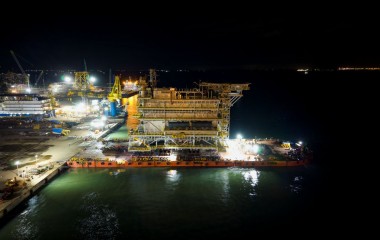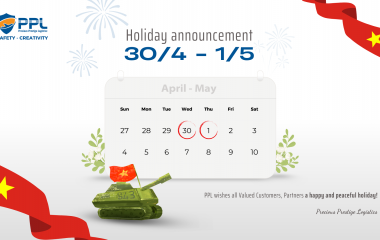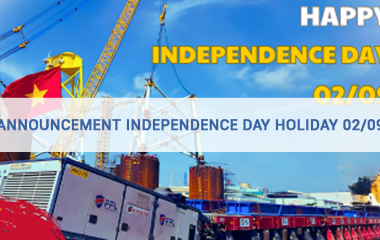Logistics businesses have a "headache" because the price of gasoline has increased without a stop
The rising price of gasoline is a concern of everyone today, and in the logistics sector, the rising price of gasoline is also a concern of businesses.
The continuous increase of gasoline prices along with great fluctuations in shipping rates is a great pressure on logistics service businesses.
The Covid-19 pandemic and the difficulties the logistics industry is experiencing
In 2022, many economic activities will be reopened to adapt to the new situation, but the volume of goods passing through the seaport has not shown signs of improvement. According to the Port Authority of Ho Chi Minh City, in January, the total number of ships entering the seaport waters of Ho Chi Minh City decreased, specifically reaching 8,455 (equivalent to 93% over the same period last year). Through February, although there was a slight growth, it was still not commensurate with the potential.
Recently, enterprises operating in the field of logistics in Ho Chi Minh City in particular and the whole country in general have faced many difficulties due to the Covid-19 epidemic, which has disrupted the global supply chain. Not only difficulties due to the decrease in orders, logistics enterprises also face a serious shortage of labor force. According to a survey of members of the Ho Chi Minh City Logistics Association (HLA), there are times when businesses have a shortage of 20 to 30% of employees.
 Difficulties the logistics industry has to go through
Difficulties the logistics industry has to go through
Meanwhile, the cost of maintaining operations of logistics enterprises is constantly increasing when they have to apply "3 on-site" and "one road, two destinations" epidemic prevention measures... However, the Businesses in the logistics industry are still making constant efforts to ensure the smooth flow of goods, minimizing the impact of supply chain disruptions caused by the pandemic.
Petrol prices continuously peaked - Difficulties piled up
At the beginning of 2022, when logistics businesses are starting to show signs of recovery, they will continue to have to bear more costs such as continuously increasing sea freight rates and recently, the cost of gasoline has peaked. The piling up difficulties are putting too much pressure on logistics enterprises. According to HLA, fuel costs account for about 30% to 35% of operating costs of logistics enterprises.
 Gasoline prices continuously peaked (Photo source: Youth Newspaper)
Gasoline prices continuously peaked (Photo source: Youth Newspaper)
Notably, most logistics service businesses sign contracts with partners for a long time. In order to adjust the freight rate, it also takes a negotiation time of at least 5 to 7 days. In the context of large fluctuations in gasoline prices every week like the past, businesses are struggling to make up for losses.
Some recommendations to help logistics businesses "breathe easier"
Pham Anh Tuan, Head of HLA Communications, said, “With the fuel market forecast to continue to increase in the near future, the risk of high inflation in 2022, logistics businesses will face many challenges in the coming time. more difficult in operation. Without timely support solutions, the increase in logistics service prices is inevitable. This not only has an indirect impact on the prices of other commodities, but also significantly reduces the competitiveness of Vietnamese manufacturing and trading enterprises.”
In order to reduce the pressure of increasing prices on the shoulders of logistics businesses and support production recovery, the Ho Chi Minh City Logistics Association proposed to exempt and reduce a number of taxes and fees such as road use fees for vehicles. transportation business. At the same time, Ho Chi Minh City also needs to consider postponing the collection of seaport infrastructure fees from February 1, 2022.
Previously, at the 23rd session on December 9, 2020, the People's Council of Ho Chi Minh City approved Resolution No. 10/2020/NQ-HDND on promulgating the fee rates for the use of infrastructure works. Public utilities in the area of border gates and seaports in the city with high fees. Specifically, goods temporarily imported for re-export, stored in bonded warehouses, goods in transit, and transshipped are subject to a charge of VND 2.2 million/container of 20 feet of dry goods and VND 4.4 million/container of 40 feet. Liquid goods, bulk goods not packed in containers are subject to a charge of 50,000 VND/ton.
For imported and exported goods, declarations outside Ho Chi Minh City will be collected at VND 500,000/container 20 feet; 1 million VND for 40 feet container and 30,000 VND/ton for liquid goods, bulk cargo not packed in containers. Import and export goods that are declared in Ho Chi Minh City will be charged a fee less than half of the above level.
In addition, the Ho Chi Minh City Logistics Association also recommended specialized management agencies to strengthen supervision of supply, to ensure that there is no intentional speculation that causes gasoline costs to rise. Increase the effective capacity of the petrol stabilization fund tool, to gradually regulate petrol prices in the current market.
In addition, it is necessary to invest in infrastructure development, diversify supply forms towards greening to save fuel and protect the environment. At the same time, it is proposed that the government reconsider taxes and fees, because according to current businesses, taxes and fees have accounted for 38 to 40% of the gasoline structure.
According to the Traffic Newspaper
Related Posts
New Posts
- NOTICE OF NATIONAL DAY HOLIDAY – SEPTEMBER 2ND PROUD TO BE VIETNAMESE
- PPL successfully performs site-move and load-out of record-breaking 4,000-ton offshore substation topside fabricated by PV Shipyard
- HOLIDAY ANNOUNCEMENT: REUNIFICATION DAY & INTERNATIONAL LABOR DAY (April 30 - May 1, 2025)
- ANNOUNCEMENT OF HUNG KINGS’ COMMEMORATION DAY 2025
- PTSC Thanh Hoa and PPL Sign Strategic Partnership
- INDEPENDENCE DAY HOLIDAY ANNOUCEMENT

_cr_380x240.jpg)


_cr_380x240.png)


Comments